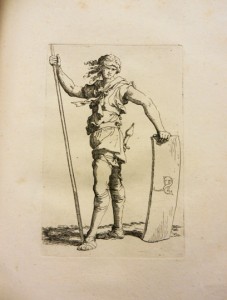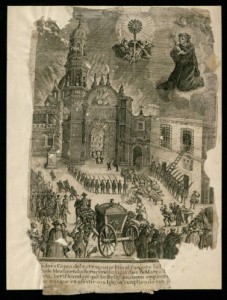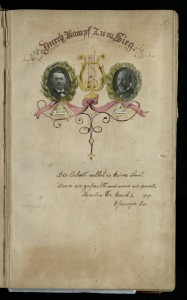
In addition to the over 7,000 linear feet of archival collections made available for study at the University of Houston Special Collections, we are also proud to offer over 100,000 rare and antique books for use in our reading room. Each month we will highlight a text from our collections and what makes it so special.
This spring semester we have been fortunate to host our first-ever UH Special Collections Social Media Intern, Shelby Love. As part of her duties, Love has been curating our Book of the Month series here on the blog. For this month (and many to come, no doubt) we share a Book of the Month selection from Shelby Love.
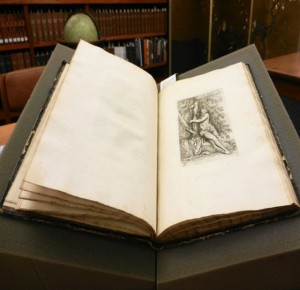
Salvator Rosa has ludentis oty Carolo Rubeo singularis amicitiæ pignus D.D.D. open to display female figurine
Book of the Month: Salvator Rosa has ludentis oty Carolo Rubeo singularis amicitiæ pignus D.D.D.
Why so Special? Salvator Rosa has ludentis oty Carolo Rubeo singularis amicitiæ pignus D.D.D. is a series of etchings by Salvator Rosa, an Italian painter and printmaker. The book was dedicated to Rosa’s Roman patron Carlo de’ Rossi. The book contains beautifully detailed portraits of peasants, women, and groups of soldiers as well as some mythological scenes. Rosa is considered to be one of the most original artists and bizarre characters of the 17th century.
The collection in this book features many etchings from Rosa’s figurine series, which went on to influence many Italian artists as elegant “stock” figures to incorporate into their works. Without the ability of color, Rosa’s traditional prints illustrate the versatility of the line to distinguish subject from object, light from shadow, and detail from outline.
This item presents a rare opportunity to experience the intricate and original artwork without the unfortunate distortion and separation of museum glass. The texture of the plate is softly written into the fabric of the paper and the viewer can also see the indention made into the paper from the plate’s edges after being run through the engraving press. These details bring the viewer excitingly close to the printmaking process that was used to create these images in a way that only originals can. Aesthetically engaging and enlightening, this collection by Rosa is just one captivating gem in Special Collections.
Location: Those interested in viewing this series of etchings in person may request call number ND623.R7R7x in the Special Collections Reading Room.
On this San Jacinto Day, the University of Houston Special Collections is happy to share more exciting developments on the digitization front with the recent publication of the Mexico Documents Collection on the UH Digital Library.
Originally combined from several smaller collections, the Mexico Documents Collection contains government orders, announcements, decrees, pamphlets, and correspondence (both personal and official) dating as far back as 1570 (manuscript on vellum) on into the 20th century. Many of the materials in the collection date from Mexican Independence (1821) through the end of the Mexican-American War (1849), but scholars with research interests in the Mexican Colonial Period or the Mexican Revolution are also likely to find some fertile ground in this collection. Researchers with limited experience in the Spanish language will also be pleased to find a number of the documents accompanied by English translations.
Thanks to this new level of access, scholars around the globe and around the clock browsing through the online collection will turn up the names of Santa Anna de Lopez, Porfirio Diaz, and Jose Joaquin de Hererra. A closer look reveals materials related to American military actions as part of the Mexican-American War, business and land transactions, as well as documents chronicling religion in Mexico.
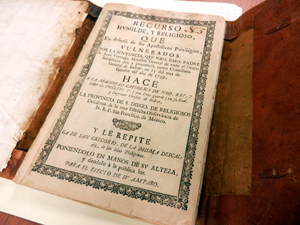
petition from the Barefoot Monks to Philip V, King of Spain (1739, from the Mexico Documents Collection)
While nothing can replicate working with a physical copy of a petition from the Barefoot Monks to Philip V of Spain in the Special Collections Reading Room, the opportunity to share online these types of centuries-old documents alongside more recent materials highlighting distinct periods of Mexican history marks another exciting step for our larger Hispanic Collections. We invite you to enjoy the Mexico Documents Collection and look forward to assisting you in your research, whether online via the Digital Library or offline next time you are able to pay us a visit.
The University of Houston Special Collections is happy to announce both the recent publication of the Houston Saengerbund Records in the UH Digital Library and significant additions and revisions made to the finding aid for the related physical collection housed here in Special Collections!
The Houston Saengerbund is a German singing society that has been active in Houston for more than a century and continues to perform at public events throughout Houston and Texas to this day. It was founded in 1883 and was one of many all-male singing organizations which formed in the German communities of Texas during the last half of the 19th century. These local groups were united under Der Deutsch-Texanische Saengerbund (the German-Texan Singers’ League), a regional organization that held biennial meetings and Saengerfeste (Singing Festivals) in various Texas cities. Both the digital collection and physical materials provide insight not only into the activities, performances, membership, and administration of this group, but also into its responses to major events and social changes throughout the last century of American history.
The digital collection consists of five bound ledgers covering the years 1874-1937. In these ledgers you’ll find meeting minutes, financial statements, programs, clippings, and correspondence between the Houston Saengerbund and other German organizations. The materials span the time from the group’s inception, through its growth to over 1000 members in the years before World War I, and to the formation of the Ladies Auxiliary and the Damenchor (Women’s Chorus) in 1937.
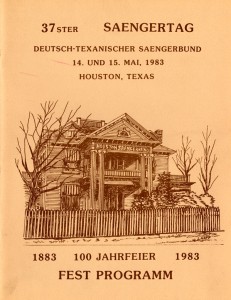
Program from the 1983 Texas Saengerfest, held in Houston and also marking the Houston Saengerbund’s centennial
The updated finding aid describes physical materials dating from 1874 to present. Here you’ll find songbooks and event materials, administrative records, legal files, financial records, and publications from all points in the group’s history. Of particular interest is the effect of anti-German sentiment that developed during the World Wars. With the onset of World War II, the Saengerbund members changed the name of the group to “The Houston Singing Society,” quit their primary activity of singing German songs, and began keeping minutes in English due to their concern about arousing anti-German sentiment. It wasn’t until after the war ended that the club members restored both their singing and their name.
The events mentioned above are just a couple of the points of interest to be found in the rich and storied history of The Houston Saengerbund. Check out the digital collection or visit us here in Special Collections to find out more!
